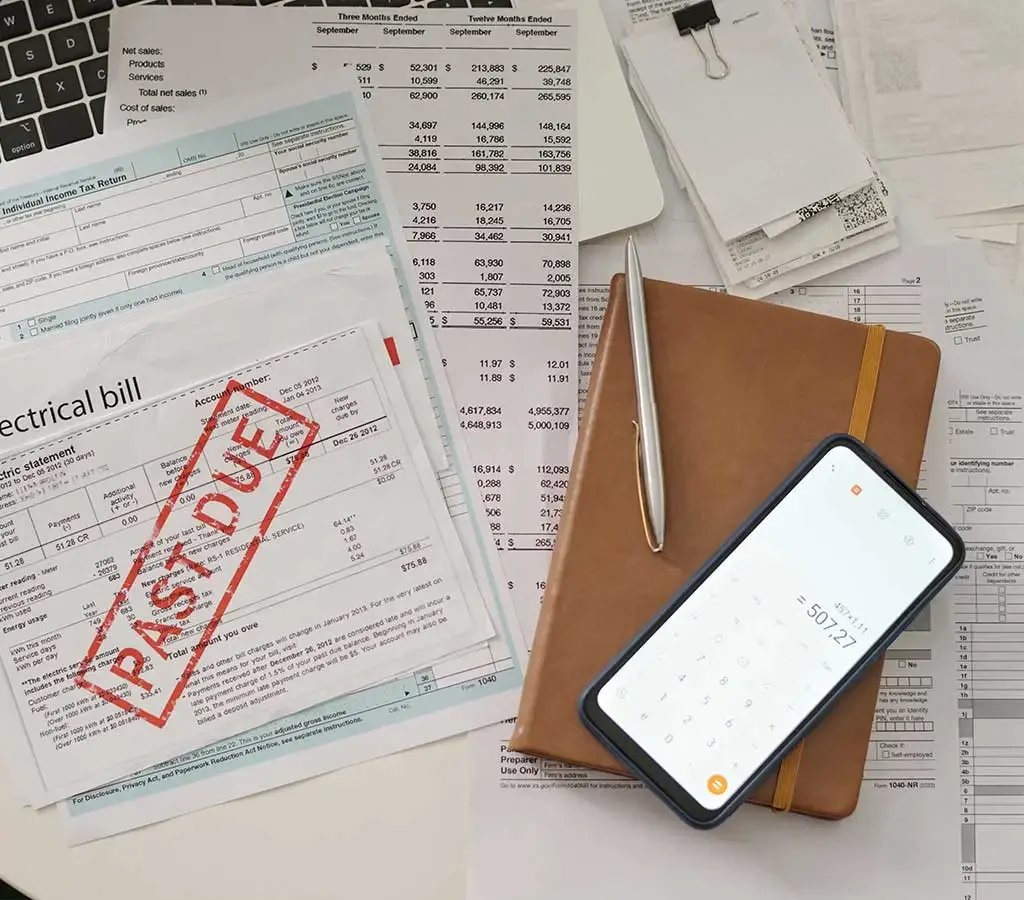No products in the cart.

Introduction
In Kuwait, staying connected through mobile and internet services is an essential part of daily life for both residents and expatriates. Whether it’s for professional communication, personal interactions, or financial transactions, telecom companies like STC and Ooredoo provide services that are integral to modern living. However, when individuals fail to settle their outstanding telecom bills, they may face severe legal, financial, and travel-related consequences that could disrupt their lives in unexpected ways.
Many expatriates mistakenly assume that unpaid telecom bills are minor financial obligations that will eventually be written off. However, Kuwaiti law treats all financial commitments seriously, including those related to telecom services. Failure to pay bills can result in legal action, asset seizure, travel restrictions, and even difficulties with residency renewals. By understanding the laws governing debt collection and financial disputes in Kuwait, individuals can take proactive measures to prevent legal trouble and maintain financial stability.
Beyond the immediate inconvenience of service suspension, unpaid telecom bills can escalate into major legal disputes that may affect an individual’s financial future, residency status, and ability to travel freely. The enforcement of these laws ensures that telecom providers have a structured method to recover outstanding debts, while debtors are held accountable for their financial obligations. Understanding the regulations surrounding unpaid telecom bills is crucial for anyone living or working in Kuwait.
This article explores the key laws, penalties, and potential consequences associated with unpaid telecom bills in Kuwait. Additionally, it provides practical guidance on the necessary steps individuals should take to avoid financial and legal difficulties before traveling or relocating.

Legal Framework for Telecom Debts in Kuwait
Kuwait has strict regulations governing contractual obligations and financial responsibilities, including telecom service agreements. Understanding the legal framework is essential for individuals to know their rights and responsibilities in case of non-payment.
1. Kuwait Civil Code (Law No. 67 of 1980)
This law serves as the foundation for all contractual agreements, including those signed with telecom companies. It establishes the principle that any agreement entered into by two parties is legally binding, and both parties are required to fulfill their respective obligations.
- Article 226 states that debtors must fulfill their financial commitments according to the terms agreed upon in their contracts.
- If an individual fails to pay their telecom bills, it is considered a breach of contract, allowing telecom companies to pursue legal action to recover the unpaid amount.
The law ensures that individuals who enter into telecom contracts are legally bound to pay their dues, and failure to do so can lead to serious consequences enforced by the legal system. A telecom contract is a financial agreement between the service provider and the customer, meaning that ignoring it can result in legal liability that extends beyond service termination.
Additionally, the Civil Code protects consumers by requiring transparency in telecom agreements. This means that telecom companies must clearly state all terms and conditions, including fees, penalties for late payments, and the legal consequences of non-payment. Customers should always review their contracts carefully to ensure they fully understand their financial commitments before signing up for telecom services.
2. Regulations from the Communications and Information Technology Regulatory Authority (CITRA)
CITRA is the regulatory body that oversees telecom services in Kuwait. It provides guidelines that govern the operations of telecom companies, ensuring they follow proper procedures when dealing with non-payment issues.
Under CITRA’s regulations, telecom companies in Kuwait have the right to:
- Suspend services for individuals who fail to pay their bills on time.
- Escalate unpaid debts to legal authorities for collection.
- Blacklist individuals with outstanding balances, affecting their ability to obtain telecom services in the future.
Telecom companies are not obligated to continue providing services indefinitely to customers who do not pay their bills. Instead, they have the legal authority to take measures that protect their financial interests, ensuring compliance with contractual agreements. CITRA also ensures that telecom companies do not impose unfair penalties on customers, and that any escalation of unpaid bills follows a regulated process.
Furthermore, CITRA provides dispute resolution mechanisms for customers who believe they have been unfairly charged. If a customer disputes a telecom bill, they have the right to file a complaint with CITRA, which will investigate the claim and mediate between the customer and the telecom provider. This system helps protect consumers from fraudulent or excessive charges while ensuring that telecom companies receive payment for legitimate services rendered.
Consequences of Unpaid Telecom Bills
Failing to settle telecom bills in Kuwait can result in a series of escalating legal and financial consequences, some of which can have long-term effects on an individual’s ability to work, travel, and conduct financial transactions.

1. Civil Lawsuits for Debt Recovery
Telecom companies have the legal right to file civil lawsuits against individuals who default on their payments. When a case is brought to court, the judge may issue orders to recover the unpaid amount through various legal means, including:
- Freezing bank accounts to extract the overdue balance directly from the debtor’s funds.
- Garnishing wages, meaning a portion of the debtor’s salary is automatically deducted to cover the unpaid bills.
- Seizing personal assets, including vehicles or other valuables, if necessary to satisfy the debt.
These measures are legally enforceable, meaning that once a court decision is made, the individual has no choice but to comply with the financial recovery process. Failing to address the lawsuit in a timely manner may result in additional penalties, legal fees, and damage to the individual’s financial credibility in Kuwait and beyond.
It is important to note that legal action does not disappear even if an individual leaves Kuwait. Many expatriates believe that they can avoid paying their debts by relocating to another country, but telecom providers have international debt collection agencies that pursue outstanding balances across borders. This means that unpaid telecom bills could potentially affect a person’s financial standing even in their home country.
2. Travel Bans Under Kuwaiti Law
One of the most concerning consequences of unpaid telecom debts is the possibility of a travel ban being imposed by the courts. Under Law No. 11 of 1962, creditors—including telecom companies—can petition the court to prevent a debtor from leaving Kuwait if they have unpaid financial obligations.
- A travel ban is enforced at all airports, land borders, and immigration checkpoints, meaning individuals attempting to leave the country may be stopped by authorities.
- The ban remains in place until the outstanding debt is fully settled, and removing it requires formal legal and administrative procedures, which may take time.
- Many expatriates discover their travel ban only when they reach the airport, leading to missed flights, financial losses, and significant stress.
For those planning to travel, it is critical to check for any outstanding financial obligations well in advance to avoid last-minute complications. Travel bans can significantly disrupt personal and professional plans, making it crucial to settle debts before attempting to leave Kuwait
3. Criminal Liability for Fraudulent Activity
Kuwaiti law strictly prohibits fraudulent financial activity, and individuals who attempt to evade telecom payments using deception may face criminal charges.
- If a person provides false personal information or issues a check that bounces, they could be prosecuted under the Kuwait Penal Code (Law No. 16 of 1960).
- Fraud-related offenses are punishable by fines, imprisonment, or both, depending on the severity of the case.
Even seemingly minor actions, such as deliberately avoiding payments or misleading telecom providers, can result in serious legal repercussions. The Kuwaiti government takes fraudulent financial activity seriously, meaning that even small unpaid telecom debts can lead to severe penalties if they involve deceptive practices.

Conclusion
Ignoring unpaid telecom bills in Kuwait is not a minor issue—it can lead to legal action, financial penalties, travel bans, and immigration complications. The country’s legal system strongly enforces financial commitments, ensuring that companies can recover debts through civil lawsuits and legal enforcement measures.
For expatriates and residents alike, being proactive about financial obligations is key to avoiding unnecessary legal trouble. Whether planning to stay in Kuwait or travel abroad, resolving outstanding debts is essential for maintaining financial stability, preventing legal complications, and ensuring a hassle-free experience.
Before making any travel arrangements, individuals should take the necessary steps to clear outstanding debts and confirm their legal standing—a small action that can prevent significant disruptions in the future.
If you like reading this, please like and share my page, DIARYNIGRCIA PAGE.
Questions or suggestions, send them to diarynigracia@gmail.com
You may also follow my Instagram account featuring microliterature, visit DIARYNIGRACIA INSTAGRAM.

Peace and love to you.